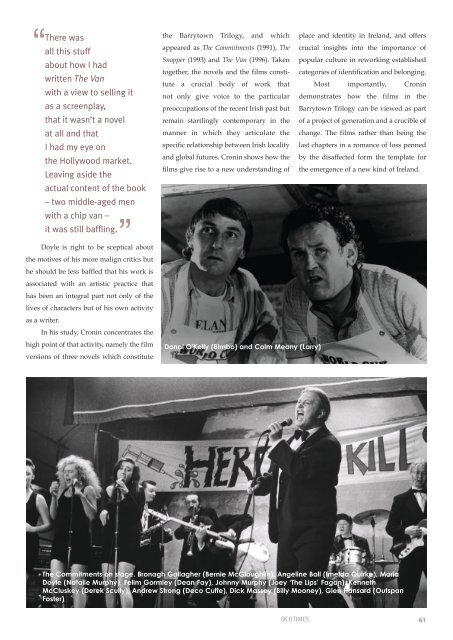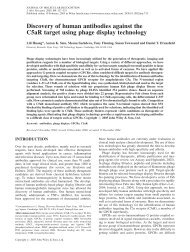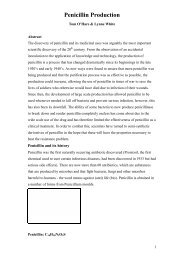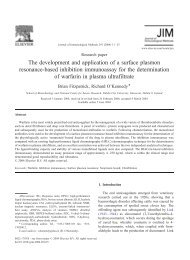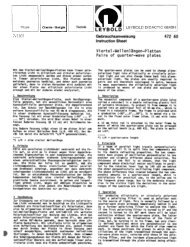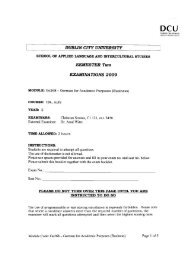Roddy Doyle under the lens
Roddy Doyle under the lens
Roddy Doyle under the lens
Create successful ePaper yourself
Turn your PDF publications into a flip-book with our unique Google optimized e-Paper software.
“ There was<br />
all this stuff<br />
about how I had<br />
written The Van<br />
with a view to selling it<br />
as a screenplay,<br />
that it wasn’t a novel<br />
at all and that<br />
I had my eye on<br />
<strong>the</strong> Hollywood market.<br />
Leaving aside <strong>the</strong><br />
actual content of <strong>the</strong> book<br />
– two middle-aged men<br />
with a chip van –<br />
”<br />
it was still baffling.<br />
<strong>Doyle</strong> is right to be sceptical about<br />
<strong>the</strong> motives of his more malign critics but<br />
he should be less baffled that his work is<br />
associated with an artistic practice that<br />
has been an integral part not only of <strong>the</strong><br />
lives of characters but of his own activity<br />
as a writer.<br />
In his study, Cronin concentrates <strong>the</strong><br />
high point of that activity, namely <strong>the</strong> film<br />
versions of three novels which constitute<br />
<strong>the</strong> Barrytown Trilogy, and which<br />
appeared as The Commitments (1991), The<br />
Snapper (1993) and The Van (1996). Taken<br />
toge<strong>the</strong>r, <strong>the</strong> novels and <strong>the</strong> films constitute<br />
a crucial body of work that<br />
not only give voice to <strong>the</strong> particular<br />
preoccupations of <strong>the</strong> recent Irish past but<br />
remain startlingly contemporary in <strong>the</strong><br />
manner in which <strong>the</strong>y articulate <strong>the</strong><br />
specific relationship between Irish locality<br />
and global futures. Cronin shows how <strong>the</strong><br />
films give rise to a new <strong>under</strong>standing of<br />
Donal O'Kelly (Bimbo) and Colm Meany (Larry)<br />
DCUTIMES<br />
place and identity in Ireland, and offers<br />
crucial insights into <strong>the</strong> importance of<br />
popular culture in reworking established<br />
categories of identification and belonging.<br />
Most importantly, Cronin<br />
demonstrates how <strong>the</strong> films in <strong>the</strong><br />
Barrytown Trilogy can be viewed as part<br />
of a project of generation and a crucible of<br />
change. The films ra<strong>the</strong>r than being <strong>the</strong><br />
last chapters in a romance of loss penned<br />
by <strong>the</strong> disaffected form <strong>the</strong> template for<br />
<strong>the</strong> emergence of a new kind of Ireland.<br />
The Commitments on stage. Bronagh Gallagher (Bernie McGloughlin), Angeline Ball (Imelda Quirke), Maria<br />
<strong>Doyle</strong> (Natalie Murphy), Felim Gormley (Dean Fay), Johnny Murphy (Joey ‘The Lips’ Fagan), Kenneth<br />
McCluskey (Derek Scully), Andrew Strong (Deco Cuffe), Dick Massey (Billy Mooney), Glen Hansard (Outspan<br />
Foster)<br />
61


